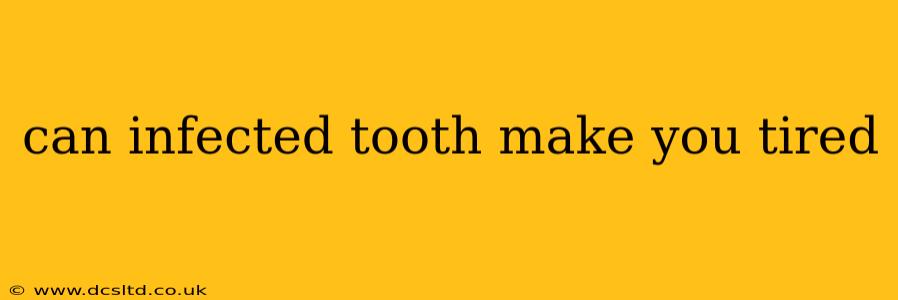Feeling unusually tired lately? While there are many reasons for fatigue, you might be surprised to learn that a seemingly minor dental issue, like an infected tooth, could be the culprit. An infected tooth, or more accurately, an oral infection, can indeed contribute to feelings of tiredness and overall lethargy. This article will explore the connection between dental infections and fatigue, answering common questions and providing insights into how to address this often-overlooked problem.
How Can a Tooth Infection Cause Fatigue?
The link between a dental infection and fatigue isn't always immediately obvious, but it's a scientifically sound connection. When bacteria infect a tooth, it triggers an inflammatory response throughout your body. This inflammation, often localized initially to the infected tooth and surrounding gums, can release chemicals like cytokines into your bloodstream. These cytokines, while crucial for fighting infection, can also have systemic effects, leading to symptoms like:
- Elevated body temperature: A low-grade fever, even unnoticed, can drain your energy levels.
- Increased heart rate: Your body works harder to combat infection, resulting in fatigue.
- Pain and discomfort: The pain itself, coupled with disrupted sleep due to discomfort, can leave you feeling exhausted.
- Immune system response: Your body's defense system is fighting the infection, depleting energy resources.
Essentially, your body is working overtime to fight the infection, leaving you feeling drained and lacking energy.
What are the Symptoms of a Tooth Infection?
Recognizing the symptoms of a tooth infection is crucial for seeking timely treatment. Beyond fatigue, other common signs include:
- Severe toothache: A persistent and throbbing pain is a major indicator.
- Sensitivity to heat or cold: Your tooth may become exquisitely sensitive to temperature changes.
- Swelling in the gums or face: Inflammation can cause noticeable swelling.
- Pus formation: Pus may form around the infected tooth.
- Bad breath: A persistent foul odor could indicate an infection.
- Difficulty opening your mouth: Severe infections can restrict jaw movement.
Can a Root Canal Cause Fatigue?
A root canal is a procedure designed to address severe tooth infections. While it is a treatment, and not the cause of fatigue itself, the initial infection and the procedure's impact on the body might cause temporary fatigue. The stress of the procedure, along with any lingering inflammation, can contribute to tiredness in some individuals. However, this fatigue should subside as the infection resolves and the body recovers.
How Long Does Tooth Infection Fatigue Last?
The duration of fatigue related to a tooth infection varies depending on the severity of the infection and the individual's overall health. Once the infection is treated, fatigue should gradually improve. However, complete recovery might take several days or even weeks, depending on the case. If fatigue persists for an extended period after treatment, it's advisable to consult your doctor or dentist to rule out other underlying causes.
How to Treat Tooth Infection Fatigue?
Treating the underlying tooth infection is paramount. This usually involves a visit to the dentist, who may recommend:
- Antibiotics: These medications help fight the infection.
- Root canal treatment: This procedure cleans and seals the infected tooth root.
- Extraction: In severe cases, the tooth might need to be removed.
In addition to addressing the infection, ensure you're getting enough rest, staying hydrated, and maintaining a healthy diet to support your body's recovery. Over-the-counter pain relievers can help manage pain and discomfort, which indirectly contributes to better sleep and reduced fatigue.
When Should I See a Dentist?
If you're experiencing fatigue alongside any of the symptoms of a tooth infection mentioned above, it's crucial to schedule an appointment with your dentist immediately. Early diagnosis and treatment are key to preventing complications and ensuring a swift recovery, minimizing both the infection and the associated fatigue. Don't ignore potential oral health problems; addressing them promptly is vital for your overall well-being.
